Lugh – Mighty God Of Light, Sun And Crafts In Celtic Beliefs
A. Sutherland - AncientPages.com - Lugh, whose name means "the shining," is one of the greatest heroes of Irish folklore. He is known under different names but is usually mentioned as Lugh of the Long Arms (sometimes, "Long Hands" or even "Artful Hands").
Celtic God Lugh. Credit: Adobe Stock - AiAdvocate.org
Lugh - the most powerful of the Celtic gods - is the god of all arts and crafts. Worshiped as the sun god, he symbolizes enlightenment and brings light to the world.
We can still recognize his name in many historic sites on the European continent. Names like Lugdunum ("the fortress of Lugha") which is today the French city of Lyon and the Dutch city of Leiden, of which name has in the past erroneously been associated with the Roman outpost Lugdunum Batavorum. Carlisle (England) was once Luguvalium, a town near Hadrian's Wall in Roman Britain and Wales. Lugh was worshiped as Lleu, while in the regions of Gaul as Lugus.
Who Is The Celtic God Lugh?
Our earlier article on Ancient Pages described how Lugh came into the world. Lugh was born from the relationship between Ethne, the daughter of the Fomorian king Balor and a young man, Cian (Kian), who belonged to Tuatha Dé Danann. Tailtiu was Lugh's foster mother, and his adoptive father was the god of the sea, Manannán mac Lir, who was older than the Tuatha de Danaan tribe people but considered one of them.
Relief of a three-faced god from northeastern Gaul believed to be Lugus, the Gaulish equivalent of Lugh. Credit: QuartierLatin1968 - CC BY-SA 3.0
Lugh was a beautiful fair-haired god with a shining face. He was the owner of a formidable spear, never missing its goal. It was an "extension of his arm," and thus, he became known as Lugh "of the Long Arms."
Lugh Appears In The Palace Of King Nuada
The Tuatha de Danann were governed unfairly by the Fomorian king Balor. Despite being half-Fomorian, Lugh wanted to fight on the side of the Dananns and help them to defeat the Fomorians.
At first, he was not particularly trusted when he, one day, arrived at the gate of king Nuada's palace as a stranger. The gatekeeper wanted to know his profession. He was refused entrance to the hall because no one was admitted without being the master of some craft.
"I am a carpenter," said the stranger.
The gatekeeper replied that the king already had a skilled carpenter and did not need another.
"Then tell the king I am a master smith."
"We already have a smith," answered the gatekeeper.
"Then I am a warrior, too," said the stranger.
Credit: Adobe Stock - La Cassette Bleue
"We do not need one," replied the gatekeeper. "The great Ogma is our champion."
The stranger proposed all possible professions he mastered, even poet, harpist, scientist, physician, sorcerer, and sculptor. Each time, he was told that king Nuada already had such a professional at court.
"Then ask the king," said the stranger (Lugh) to the gatekeeper, "if he has with him a man of all these crafts at once, for if he has, there is no need for me at Tara."
Eventually, Lugh was allowed in because he had mastered many skills. The Tuatha de Danann admired his strength and intelligence and called him Samildanach ("Many-Skills"). He became the Tuatha's temporary king when Nuada lost his hand in battle, and after Nuada's death, Lugh became the Tuatha's rightful king.
The Fomorians were finally defeated, and Lugh's brave accomplishment helped bring freedom to the Irish.
Image source: Gods and Demons Wiki
Lugh led the Dananns against the Fomorians in the second and final battle of Mag Tuired. He killed his grandfather Balor by piercing him through his evil eye with a slingshot and cutting off his head.
At the same time, he fulfilled an old Druid prophecy saying that Balor, the Fomorian tyrannical king, would be killed by his grandson, so it happened.
Lugh was also the spiritual guide of his son, Cuchulainn, and fought in his son's place to give him rest during his lone and very tiring combat.
Lugh's most famous weapon was called the "Invincible Spear" or the "Spear of Victory," with properties similar to the Sword of Nuada - when thrown, it momentarily hit its target.
The spear was blazingly hot and became hotter the longer it was used. It was stored in a vat of water at night to keep it from catching fire and scorching the earth.
Written by – A. Sutherland AncientPages.com Staff Writer
Updated on January 21, 2023
Copyright © AncientPages.com All rights reserved. This material may not be published, broadcast, rewritten or redistributed in whole or part without the express written permission of AncientPages.com
Expand for referencesReferences:
Leeming, D. The Oxford Companion to World Mythology
Sjoestedt, Marie-Louise. Celtic Gods and Heroes
History, Hourly. Celtic Mythology
More From Ancient Pages
-
 Dozens Of Unique 2,500-Year-Old Ceremonial Treasures Discovered In A Drained Peat Bog
Archaeology | Jan 27, 2023
Dozens Of Unique 2,500-Year-Old Ceremonial Treasures Discovered In A Drained Peat Bog
Archaeology | Jan 27, 2023 -
 Magnetic Fields Used To Explore Doggerland And Other Prehistoric Submerged Sites
Archaeology | Mar 10, 2023
Magnetic Fields Used To Explore Doggerland And Other Prehistoric Submerged Sites
Archaeology | Mar 10, 2023 -
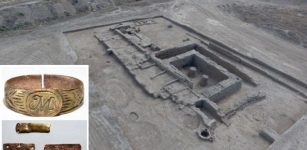 Stunning Ancient Khanqah With Large Underground Crypt, Ritual Halls And Burials Discovered In Turkestan
Archaeology | Aug 14, 2020
Stunning Ancient Khanqah With Large Underground Crypt, Ritual Halls And Burials Discovered In Turkestan
Archaeology | Aug 14, 2020 -
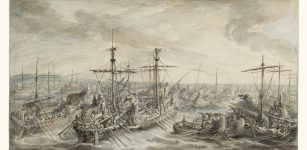 Battle Of Cape Ecnomus: One Of The Greatest Naval Battles In History
Ancient History Facts | Jun 17, 2019
Battle Of Cape Ecnomus: One Of The Greatest Naval Battles In History
Ancient History Facts | Jun 17, 2019 -
 Unknown Purpose Of The Mysterious Huge Iron Age Ceramic Sharjah Jar Puzzles Scientists
Archaeology | Oct 7, 2022
Unknown Purpose Of The Mysterious Huge Iron Age Ceramic Sharjah Jar Puzzles Scientists
Archaeology | Oct 7, 2022 -
 Why Do Some Cities Only Last A Century While Others Prosper For A Thousand Years Or More?
Archaeology | Mar 6, 2023
Why Do Some Cities Only Last A Century While Others Prosper For A Thousand Years Or More?
Archaeology | Mar 6, 2023 -
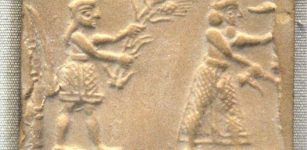 Who Was The Sumerian Ensi?
Featured Stories | Jan 24, 2020
Who Was The Sumerian Ensi?
Featured Stories | Jan 24, 2020 -
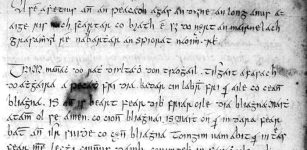 Is This The World’s Oldest Joke?
Featured Stories | Feb 21, 2014
Is This The World’s Oldest Joke?
Featured Stories | Feb 21, 2014 -
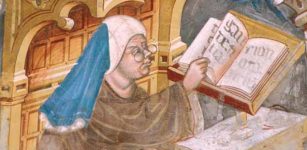 History Of Eyeglasses: One Of The Most Important Inventions Is Lost To History
Ancient Technology | Mar 10, 2016
History Of Eyeglasses: One Of The Most Important Inventions Is Lost To History
Ancient Technology | Mar 10, 2016 -
 Ancient City Machu Picchu Was Originally Called Huayna Picchu By The Incas – Study Of The Name Reveals
Archaeology | Mar 23, 2022
Ancient City Machu Picchu Was Originally Called Huayna Picchu By The Incas – Study Of The Name Reveals
Archaeology | Mar 23, 2022 -
 Anglo-Saxon Watermill Discovered In Buckinghamshire, UK
Archaeology | Mar 13, 2023
Anglo-Saxon Watermill Discovered In Buckinghamshire, UK
Archaeology | Mar 13, 2023 -
 Ruins Of The Ancient City Of Palmyra Documented – What Remains After The Fall Of The Assad Regime
Archaeology | Feb 14, 2025
Ruins Of The Ancient City Of Palmyra Documented – What Remains After The Fall Of The Assad Regime
Archaeology | Feb 14, 2025 -
 Mysterious Books From The Unknown And ‘Impossible’ Coincidences
Featured Stories | Dec 30, 2020
Mysterious Books From The Unknown And ‘Impossible’ Coincidences
Featured Stories | Dec 30, 2020 -
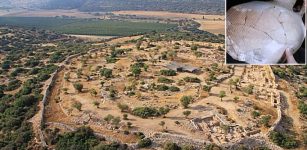 Biblical Tefach: Amazing ‘Common Constant’ Found Among Ancient Storage Jars In Israel
News | Oct 14, 2020
Biblical Tefach: Amazing ‘Common Constant’ Found Among Ancient Storage Jars In Israel
News | Oct 14, 2020 -
 Biblical Mysteries – Foods And Drinks That Gave Extraordinary Powers, Knowledge And Immortality
Ancient Mysteries | Mar 22, 2017
Biblical Mysteries – Foods And Drinks That Gave Extraordinary Powers, Knowledge And Immortality
Ancient Mysteries | Mar 22, 2017 -
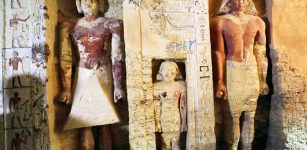 Rare Archaeological Discoveries In The Sacred Animal Necropolis In Saqqara
Archaeology | Apr 26, 2020
Rare Archaeological Discoveries In The Sacred Animal Necropolis In Saqqara
Archaeology | Apr 26, 2020 -
 Underground Ancient City Of Kish And Its Advanced Hydraulics System
Ancient Technology | Aug 28, 2015
Underground Ancient City Of Kish And Its Advanced Hydraulics System
Ancient Technology | Aug 28, 2015 -
 Fragments Of Old City’s Fortifications And Carved Hand Imprint Unearthed In Jerusalem
Archaeology | Jan 25, 2023
Fragments Of Old City’s Fortifications And Carved Hand Imprint Unearthed In Jerusalem
Archaeology | Jan 25, 2023 -
 Old Book Mysteriously Controlling The Minds Of Thousands Was Banned – But What Or Who Caused This Chilling Phenomenon?
Featured Stories | Nov 5, 2024
Old Book Mysteriously Controlling The Minds Of Thousands Was Banned – But What Or Who Caused This Chilling Phenomenon?
Featured Stories | Nov 5, 2024 -
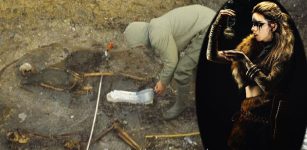 Mysterious Viking Gerdrup Grave – Burial Place Of Sorceress Katla And Her Son Odd Mentioned In The Eyrbyggja Saga?
Featured Stories | Mar 22, 2023
Mysterious Viking Gerdrup Grave – Burial Place Of Sorceress Katla And Her Son Odd Mentioned In The Eyrbyggja Saga?
Featured Stories | Mar 22, 2023




